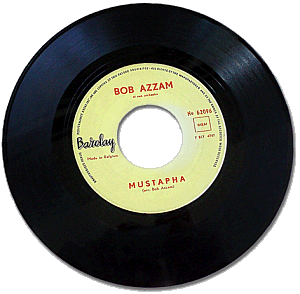"Ya Mustapha!"
A Song Conquers the World
One of the most covered songs of the last 50 years is not from the Beatles but an old Oriental folk song. It seems that nearly everyone has heard at least one version of "Ya Mustapha!”
Many dancers know George Abdo's version of this piece, and another one, arranged and played by John Bilezikjian, is popular, too. This familiar tune appears also on a Mezdeke CD (Number 6), but there, its title appears as "Ruh Rahleh".
It is difficult to track the roots of "Mustapha", but it is almost certain that they were in North Africa, and most probably, in Egypt. One source told me that the song appears in a popular old Egyptian film. What I know certain is that it is a popular party song in the entire Middle East!
The Arabic text is about a man named (what else?) Mustapha, who has been away from home for a long time and the lyrics ask him to come back soon—or at least write home.
In the Turkish version, a young woman tells her boyfriend: "Let’s get married and put an end to this; I have a child in my belly!”
In Europe, the song became popular with the help of Bob Azzam (who published it in 1960 in France with rather silly lyrics consisting of at least 3 languages): "Chérie je t'aime, chéri je t'adore - como la salsa del pomodoro" (Darling, I love you, darling, I adore you – like tomato sauce). The number, considered cute, was a big hit and progressed up to number 23 in the British hit charts and even number 1 in Belgium. It also sold well in Greece, Italy, and Brazil. Bob Azzam recorded other songs like "Fais-moi du couscous chéri" (Make couscous for me, darling).
Bruno Gigliotti (Orlando) the brother of famous singer Dalida also covered the song. Bruno and Dalida grew up in Cairo where their father worked as first violinist at the opera. (Dalida even won election to the title of Miss Egypt in 1954.) Orlando became a famous singer and worked in all the important nightclubs in Cairo. In the early ‘60s, he went to Paris to become a big star like his sister. He remembered short parts of the song "Ya Mustapha” and recorded it. Therefore, long before Raï was developed in North Africa, Orlando became the first singer to record a mix of both French and Arabic lyrics. Two of his other songs were entitled "Fattouma" and "Ali Baba," and he recorded repeatedly in both French and Italian. From 1966 on, he served as the Artistic Director and Producer for Dalida.
After its initial successes, "Ya Mustapha“ did not loose its popularity–to the contrary! The simple melody, to which everyone can join in and sing along, soon became a standard and still belongs in the repertoire of every presentable French karaoke-list, as well as band repertoire, around the world. The best-known interpretation in Turkey is by Dario Moreno. Over the years, uncountable versions also appeared in every language: Maltese, Flemish, Hindi, English, German and others. Most of the versions are parodies and comical numbers; some include raunchy lyrics. In a German version that Leo Leandros sang in the early ‘60s, there is a lyric stanza about a nut seller in the bazaar who falls in love with the sultan’s lovely daughter.
In 1967, Clinton Ford recorded the song under the name of "Ali Ben Dhown" on a single that had on its verso, a similarly silly song titled “Turkish Delight.”
Frequently learned and sung phonetically (without understanding of French and/or Arabic), the song’s lyrics changed inadvertently. For example, I found a version on a Thai discussion forum where the word “pomodoro“ had become “dommo do re.”
The French label APC produced a 1994 titled "Think about Mustapha" that unites nine versions and interpretations of this song: a jazz version, a ‘60s surf sound, raï, and even a fusion version featuring an Indian sitar!
Beware! The Arabic name Mustapha (Mustafa) is very popular and not every song that titled “Mustapha” stems from the original song. The Queen’s album, “Jazz,” includes a song called “Mustapha,” and The Clash feature their “Mustapha Dance” (better known as “Rock the Casbah”). Additionally, a "Ya Mustapha" exists by the Sabri Brothers who ordinarily play religious Qawwali music, however, these are actually other melodies with only the same title in common.
Hear and see the song:
Bob
Azzam
Dario
Moreno
Leo
Leandros
Clinton
Ford
Bollywood
Version - Film Aatish
Les
Allumettes
Magnifico